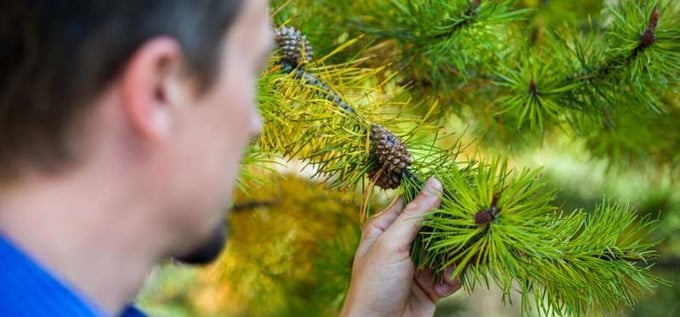May 19, 2025 | 01:13 GMT +7
May 19, 2025 | 01:13 GMT +7
Hotline: 0913.378.918
May 19, 2025 | 01:13 GMT +7
Hotline: 0913.378.918

The recent UCalgary study suggests there are some key genes that are particularly important for how plants respond adaptively to environmental change. Credit: University of Calgary.
Dr. Sam Yeaman, Ph.D. and his team in the Department of Biological Sciences have published a new study, titled "Repeated Global Adaptation across Plant Species," in the journal Proceedings of the National Academy of Sciences(PNAS).
The research, led by Dr. Gabriele Nocchi, Ph.D., is a first look at whether distantly related plant species-from sunflowers to poplars- use the same genes to adapt to similar stress.
The answer?
"Yes, and no," Yeaman, an associate professor in the Faculty of Science, says in an interview. "They do overlap more than randomly, but they still do a lot of different things. You could say that while each species has its own story, they share many of the same characters."
The study suggests there are some key genes that are particularly important for how plants respond adaptively to changes in their environment.
It comes a few months after Yeaman's lab published another study titled "The Genetic Architecture of Repeated Local Adaptation to Climate in Distantly Related Plants" in Nature Ecology & Evolution.
That paper, published with an international team of authors in August, analyzed genomic data from 25 distantly related plant species, including many of the same species studied in this new paper. It found many genes were repeatedly involved in adaptation to similar climate factors.
While both studies examined how plants adapt to their environment, there were differences.
The Nature paper studied how plants adapt to spatial changes, from the frigid Yukon boreal to the temperate B.C. rainforests; and the PNAS paper explores how species adjust to a change in environment over time.
"Taken together, they give us a better understanding of what's happening," explains Yeaman.
He says much of the research is pure science right now, but there's a lot of excitement about it in the agriculture and biotech industries. That's because it helps in the understanding of how plants use similar genetic mechanisms to adapt to their environment.
Those genes could be important for developing crops that are more resilient to climate-related challenges, which would help to improve food security.
The research also tests important predictions of evolutionary theory, a concept Yeaman explained with a day-to-day example from our homes.
"You can flip your thermostat and turn your furnace on or off to make a big change in temperature, or you can make renovations to improve your home's overall thermal efficiency, doing lots of small tweaks; from improving insulation to upgrading windows to fixing air leaks."
Evolution, he says, favors a similar difference in strategy.
"When the whole species is adapting to a new stress like climate change (over time), theory predicts it will tend to involve many small mutations," explains Yeaman. "But when different populations inhabit hot versus cold environments (over space), the best strategy is to have a small number of big mutations that act like thermostats controlling the difference between populations in hot versus cold conditions."
Consistent with those theories, his team found in the Nature Ecology & Evolution paper that genes driving adaptation over space tend to have larger effects, while in the PNAS paper they found that genes driving adaptations over time tend to have smaller effects.
"In both cases, we would find the same genes popping up over and over again in species as different as sunflower and poplar," he says.
(Phys.org)

(VAN) 14 out of 35 domesticated elephants in Dak Lak province have had their living conditions improved, with 11 of them currently participating in the non-riding elephant tourism model.

(VAN) Muong Nhe Nature Reserve hopes that being upgraded to a national park will lay the foundation for forest protection efforts to be carried out in a systematic, modern, and sustainable manner.
/2025/05/16/3923-2-171845_52.jpg)
(VAN) Lower costs, higher yields, and improved soil quality are outstanding benefits that soybeans bring when integrated into the crop rotation system.

(VAN) The 'For a Green National Environment' programme aims to promote a green lifestyle, support businesses in implementing ESG practices, and turn Net Zero commitments into concrete actions.

(VAN) Cold-barn systems efficiently manage environmental and temperature conditions, which aids in the prevention of respiratory diseases in pigs and protects them from the vectors that transmit African swine fevers.

(VAN) To tackle challenges, the project 'Addressing key technical bottlenecks in the grouper supply chain in Vietnam' has been underway since 2024.

(VAN) The project 'Disease-Resilient and Sustainable Cassava Production Systems in the Mekong Region', funded by the Australian Center for International Agricultural Research (ACIAR), is being implemented from 2024 to 2028.